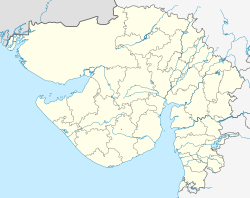This article may need to be rewritten to comply with Wikipedia's quality standards.(March 2025) |
| Modheshwari Mata Temple | |
|---|---|
મોઢેશ્વરી માતાજી | |
 Main entrance of the temple | |
| Religion | |
| Affiliation | Hinduism |
| District | Mehsana |
| Deity | Modheshwari |
| Location | |
| Location | Modhera |
| State | Gujarat |
| Country | India |
| Geographic coordinates | 23°35′00″N72°08′43″E / 23.5834°N 72.1454°E |
| Architecture | |
| Style | Solanki |
| Creator | King Bhima I |
| Completed | 1026-1027 CE |
Modheshwari Mata Temple is an ancient Hindu temple located in Modhera village of Mehsana district in Gujarat, India. The temple is dedicated to the Hindu mother-goddess Modheshwari Mata, an aspect of the divine feminine Shakti. It was built around 1026-1027 CE during the reign of the Solanki dynasty king Bhima I. [1]



